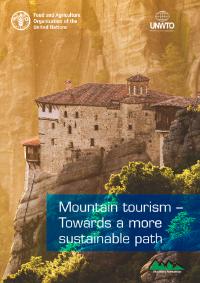The FAO’s Mountain Partnership Secretariat and the United Nations World Tourism Organization (UNWTO) recently published the joint report Mountain tourism – Towards a more sustainable path. While tourism was the focus of the 2021 International Mountain Day on the 11th December, this publication contributes to stressing the role of tourism in the sustainable development of mountain regions.
It features examples of innovation, best practices and initiatives from all over the world, including Europe. Some of the cases show how entrepreneurs were trained to promote local tourism, producers and handcrafts in the Carpathians or how a tourism strategy was adopted in the Slovenian Alps to tackle over-tourism by bringing visitors away from crowded areas and making them discover new places. Examples also include an initiative from South Tyrol, Italy, which aimed to understand the challenges faced by mountain tourism stakeholders during the COVID-19. These examples illustrate the report’s recommendations: mountains need to innovate and develop new offers to both boost the recovery of the sector after the COVID-19 pandemic but also to make mountain tourism more sustainable.
Tourism is key for the development of Europe’s mountains. In 2018, 13% of personal trips made by EU residents were in mountain areas (see Eurostat). Yet, mountain areas are confronted to various challenges. Some territories face over-tourism and conflicts between residents and visitors. This was highlighted in the recent Euromontana report on mountain youth, particularly in the French and Italian Alps. Other regions are struggling to attract visitors, to develop mobility offers up to the last kilometre, or to adapt their activities to a changing climate. This joint report on mountain tourism can therefore be a source of inspiration for addressing these different issues.
In Europe, regional and local challenges can also be overcome with the support of the European Union’s Cohesion Policy. As demonstrated by Montana174, Cohesion Policy provides support for the development of tourism in the mountains, for the creation of new offers, the development of strategies to improve sustainability or promote cultural heritage for example. Examples are available in Montana174’s brochure The Cohesion Policy supports tourism in mountain areas.
27 January 2022









